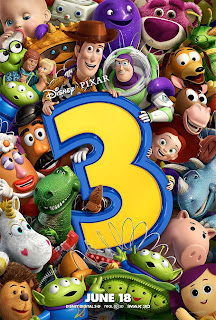
In 1995, Toy Story came out and frankly, I thought I was too old to like it. I did anyway because it did what all Pixar films do and that is strike at a truth that we all know to be true. In this particular case, that when we were little we totally thought our toys were alive and did stuff when we left the room. Toy Story 2 was actually an incredible sequel especially for an animated film because we all know those usually turn out to be a bunch of crap. (Shrek 4, anyone?) Toy Story 3 was the first movie of 2010 that I knew I HAD to see.
Story. We find the toys languishing as Andy is nearly grown up and hasn't played with them in years. Andy is going to college and the toys are struggling with what this means for them. They decide to try life at Sunnyside Day Care, against Woody's wishes as he feel ardently that they are Andy's toys and should go wherever Andy wants them to. Here is a clip from some of their tour:
I have to say that the whole Barbie/ken storyline is one of the greatest parts of the film and maybe the most obvious/clever thing ever. Woody decides to go back to Andy and gets sidetracked when he's picked up by a little girl named Bonnie. Life at Sunnyside is not what it's cracked up to be.
I called this when Lotso Huggin' Bear came onscreen. I turned to my brother and said, "This whole thing is going to turn out like Cool Hand Luke." I give you night in the box.
That was Cool Hand Luke obviously and not Toy Story 3, but this is what YouTube makes available to me. I do promise someone does spend a night in the box. Woody gets to know Bonnie and her toys, where we discover all dinosaur toys are tech savvy and Woody gets to experience what it's like to be played with again, which breathes love in him and puts a crack in his stoicism about being Andy's toy. Also, Timothy Dalton gives probably the best performance of his career as a Shakespeare-inclined porcupine toy. Inspired. Yeah, I'm still bitter about his two Bond movies.
Woody makes his way back to Sunnyside where the toys have gone all Lord of the Flies and Buzz has been reset to think yeah, he's a spaceman. The toys try to fix him.
Anyway, the toys have to escape. They make their way home in ways that I don't want to ruin and nearly gave me a heart attack. But they get home, resigned to their fates. Woody overhears Andy and his mom talking. Andy's mom is upset and Andy reassures her that she'll always be with him, even when they're not together. Woody realizes that Andy no longer needs him, that's he is already a part of him that he will carry for the rest of their life and Woody is finally able to let go. We see him scribble something on the box the toys are in and then he joins them.
The note leads Andy to Bonnie's house, where he gives Bonnie the toys. As he does so, he describes each one of them and in doing so, we realize that he is describing parts of himself. No more so is this evident that when he is surprised to discover Woody at the bottom of the box and for a second, we see just a kid who doesn't want to give up his favorite toy. But he does and he and Bonnie play with the toys before he drives off to college.
We see some of the toys' life with Bonnie and get to see the toys at Sunnyside. And finally I stop crying along with everyone else in the theater.
The reason that this movie hits you so hard is that it draws on the nostalgia of childhood, places you don't usually delve into so when you do it's powerful. I would say that most movies depend on flash and new technology and while Toy Story 3 has those it doesn't RELY on them other than to technically get the story across. I was at the Austin Film Festival this past year and one of the decided highlights of the festival was a panel with the screenwriter of this film, Michael Arndt, who also wrote Little Miss Sunshine. He spoke about something which I never heard discussed in film school, which is the philosophical stakes of a story, that in order for your story to succeed it has to be about something other than a flashy, glittering surface. For instance, in this movie it's about what is the role of a toy? Is Lotso right or is Woody? Or does Woody have it wrong?
Anyway, of course we know this movie does not have a snowball's chance in hell of winning Best Picture, but it was still one of my favorites of the year. I still marvel at the emotional effect that it has on people. I know people are starting to sneer at Pixar but that's only because everything they do is so good and when you're good, you're a target. This is the rare case when the last part of a series has left me satisfied, content to leave it where it is, to never want to go back. Hear me, Pixar? Don't revisit this! You'll kill it! Shrek 4, anyone?










